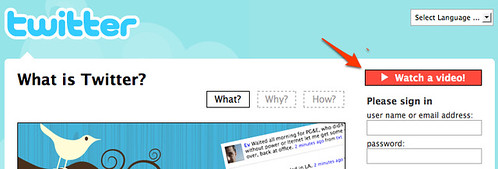A year ago today, I was writing the script for the video "Twitter in Plain English." A year later, the video has over 2.6 million views, thanks to a bit of collaboration between a handful of companies. Here's how:
We decided to make "Twitter in Plain English" for the same reason we made "RSS in Plain English " - it was a concept with huge potential that needed a better explanation. We wanted people to understand a resource that we value.
Twitter, Inc. didn't hire us to create the video and had no creative input on the project. However, I did share the video with Biz Stone and he saw opportunities. We made a simple deal where they could use it on their site and we retained all rights, etc.
Around April of 2008, this button appeared on Twitter.com, linking visitors to the video and our web site.

We loaded the video to a few hosts, like YouTube, Vimeo and dotSUB. Twitter chose to use the video player from dotSUB.com. If you're not aware of dotSUB, it's an amazing free service that enables any video to have subtitles in mutiple languages. Twitter embedded the dotSUB player and the ball began to roll.
Fast-forward to today and it's clear that the video has been a hit. Here's a graph of the daily views over the last year six months via dotSUB:
I think it's interesting to see the "hockey stick" formation over the last couple of months. My guess is that this is an indication of the growing number of people visiting Twitter.com. 2 million views on dotSUB are added to 600k on YouTube and 70k on Vimeo to get to 2.6 million overall views.
Michael Smolens, a friend and someone who founded dotSUB.com shared the stats this way, regarding the Twitter video on dotSUB:
The number of daily views is now at more than 30,000/day, up from 6,000/day 3 months ago. It is now in 53 languages, and is embedded on 3,397 different URLs.
Thanks to dotSUB's free, volunteer-based subtitling service, the video can be embedded and viewed with subtitles in 53 languages, making it accessible globally.
What I love about this story is that it's a win-win that's not predicated directly upon making money. We made the video on our own time. Twitter chose to use a free video service that opened the video to a global audience. Almost a year later, and Common Craft is getting a lot of referrals from Twitter.com and licensing deals, Twitter gets a video for explaining their service, dotSUB gets a perfect way to expose the value of their service and the people of the Web get a fun video that explains something that's difficult to understand. Win-win-win-win?
NOTE: In terms of our business model, Twitter is an exception, as we believe it is an exceptional product. At this stage in our evolution, I don't want to set the expectation that we will produce product-based videos on our own time.